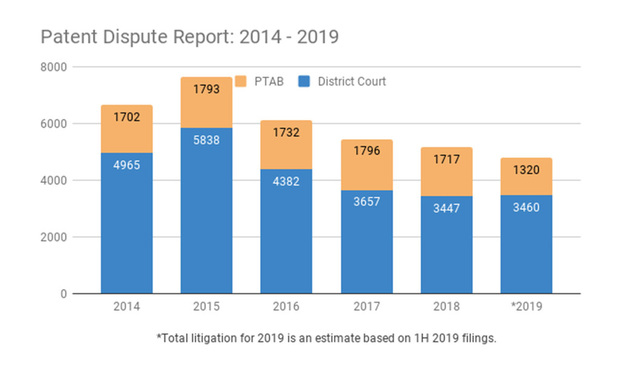Patent Lawsuits Up in 2019; PTAB Filings Down
PTAB's increasing reluctance to hold trials on patent validity challenges is one possible factor on why filings could be down, experts say. Yet, Unified Patents is doing its part to keep the PTAB busy. It filed 28 petitions during the first half of the year, tied with Google for second most, behind only Apple Inc.
July 03, 2019 at 05:26 PM
3 minute read
The original version of this story was published on National Law Journal
 Patent Dispute Report 2014-2019 (Photo: Unified Patents)
Patent Dispute Report 2014-2019 (Photo: Unified Patents)
The first half of 2019 is in the books and Unified Patents has already crunched the numbers on patent litigation (you can view the full report here). Two notable findings: Suits by nonpracticing entities (NPEs) are on the comeback in district courts, while Patent Trial and Appeal Board filings are substantially down for the first time in years.
Some 660 administrative challenges to patent validity were filed at the U.S. Patent and Trademark Office's PTAB in the first half of the year. That puts petitions on pace for 1,320 this year, which would be a 24% drop from the 1,748 average for the last five years. (Filings had been remarkably steady up till now, numbering 1,702, 1,793, 1,732, 1,796 and 1,717 over the previous five years.)
Nate Kelley, the former PTO solicitor and acting PTAB chief judge who's now a partner at Perkins Coie, said that new rules governing institution decisions may be coming into play. He notes the board is increasingly willing to invoke its Section 325(d) discretion to deny multiple petitions raising the same prior art or arguments (even from different petitioners). “There is a perception that we are inching towards a one-and-done regime,” Kelley said. “The fact that a first petition was denied can be the very reason why a second petition will be denied. As a result, there is probably a lot more care going into each and every petition.”
Former PTAB Judge Scott Kamholz, who now practices at Covington & Burling, said the declining institution rate in general could be discouraging petitioners. PTAB decisions not to institute proceedings don't stop accused infringers from putting on the same invalidity defense in district court. But in general, “district judges don't like it if you come into court with something that couldn't pass muster at the institution stage,” Kamholz said.
Kamholz thinks a lot of other factors could be in play too. A strong economy could have business leaders more focused on building their companies rather than fighting over patents; the Supreme Court's SAS Institute decision has arguably put more teeth into the estoppel rules; and, paradoxically, the PTAB's own success at cooling off district court litigation might be catching up with it. “Dampening demand for patent litigation dampens the need for PTAB proceedings,” he theorized.
By this time next year, it will become clear if that last theory holds true, now that NPE filings are back on the upswing in district courts. (NPEs are entities that acquire patents to assert them against others. The PTAB was established in part to deal with NPEs that were perceived by some as leveraging the cost of patent litigation for nuisance value settlements.)
Unified Patents counts 1,730 new district court filings overall during the first half, including almost 900 in Q2, which it says is the most in a single quarter since 2017. That number was fueled in part by 550 NPE suits, which Unified Patents says is the most in a single quarter since 2016.
Unified Patents, whose mission is to deter abusive NPE activity, is doing its part to keep the PTAB busy. It filed 28 petitions during the first half, tied with Google for second most, behind only Apple Inc.
This content has been archived. It is available through our partners, LexisNexis® and Bloomberg Law.
To view this content, please continue to their sites.
Not a Lexis Subscriber?
Subscribe Now
Not a Bloomberg Law Subscriber?
Subscribe Now
NOT FOR REPRINT
© 2025 ALM Global, LLC, All Rights Reserved. Request academic re-use from www.copyright.com. All other uses, submit a request to [email protected]. For more information visit Asset & Logo Licensing.
You Might Like
View All
Meta agrees to pay $25 million to settle lawsuit from Trump after Jan. 6 suspension
4 minute read
How We Won It: Latham Secures Back-to-Back ITC Patent Wins for California Companies
6 minute read
Trending Stories
- 1Two Wilkinson Stekloff Associates Among Victims of DC Plane Crash
- 2Two More Victims Alleged in New Sean Combs Sex Trafficking Indictment
- 3Jackson Lewis Leaders Discuss Firm's Innovation Efforts, From Prompt-a-Thons to Gen AI Pilots
- 4Trump's DOJ Files Lawsuit Seeking to Block $14B Tech Merger
- 5'No Retributive Actions,' Kash Patel Pledges if Confirmed to FBI
Who Got The Work
J. Brugh Lower of Gibbons has entered an appearance for industrial equipment supplier Devco Corporation in a pending trademark infringement lawsuit. The suit, accusing the defendant of selling knock-off Graco products, was filed Dec. 18 in New Jersey District Court by Rivkin Radler on behalf of Graco Inc. and Graco Minnesota. The case, assigned to U.S. District Judge Zahid N. Quraishi, is 3:24-cv-11294, Graco Inc. et al v. Devco Corporation.
Who Got The Work
Rebecca Maller-Stein and Kent A. Yalowitz of Arnold & Porter Kaye Scholer have entered their appearances for Hanaco Venture Capital and its executives, Lior Prosor and David Frankel, in a pending securities lawsuit. The action, filed on Dec. 24 in New York Southern District Court by Zell, Aron & Co. on behalf of Goldeneye Advisors, accuses the defendants of negligently and fraudulently managing the plaintiff's $1 million investment. The case, assigned to U.S. District Judge Vernon S. Broderick, is 1:24-cv-09918, Goldeneye Advisors, LLC v. Hanaco Venture Capital, Ltd. et al.
Who Got The Work
Attorneys from A&O Shearman has stepped in as defense counsel for Toronto-Dominion Bank and other defendants in a pending securities class action. The suit, filed Dec. 11 in New York Southern District Court by Bleichmar Fonti & Auld, accuses the defendants of concealing the bank's 'pervasive' deficiencies in regards to its compliance with the Bank Secrecy Act and the quality of its anti-money laundering controls. The case, assigned to U.S. District Judge Arun Subramanian, is 1:24-cv-09445, Gonzalez v. The Toronto-Dominion Bank et al.
Who Got The Work
Crown Castle International, a Pennsylvania company providing shared communications infrastructure, has turned to Luke D. Wolf of Gordon Rees Scully Mansukhani to fend off a pending breach-of-contract lawsuit. The court action, filed Nov. 25 in Michigan Eastern District Court by Hooper Hathaway PC on behalf of The Town Residences LLC, accuses Crown Castle of failing to transfer approximately $30,000 in utility payments from T-Mobile in breach of a roof-top lease and assignment agreement. The case, assigned to U.S. District Judge Susan K. Declercq, is 2:24-cv-13131, The Town Residences LLC v. T-Mobile US, Inc. et al.
Who Got The Work
Wilfred P. Coronato and Daniel M. Schwartz of McCarter & English have stepped in as defense counsel to Electrolux Home Products Inc. in a pending product liability lawsuit. The court action, filed Nov. 26 in New York Eastern District Court by Poulos Lopiccolo PC and Nagel Rice LLP on behalf of David Stern, alleges that the defendant's refrigerators’ drawers and shelving repeatedly break and fall apart within months after purchase. The case, assigned to U.S. District Judge Joan M. Azrack, is 2:24-cv-08204, Stern v. Electrolux Home Products, Inc.
Featured Firms
Law Offices of Gary Martin Hays & Associates, P.C.
(470) 294-1674
Law Offices of Mark E. Salomone
(857) 444-6468
Smith & Hassler
(713) 739-1250







